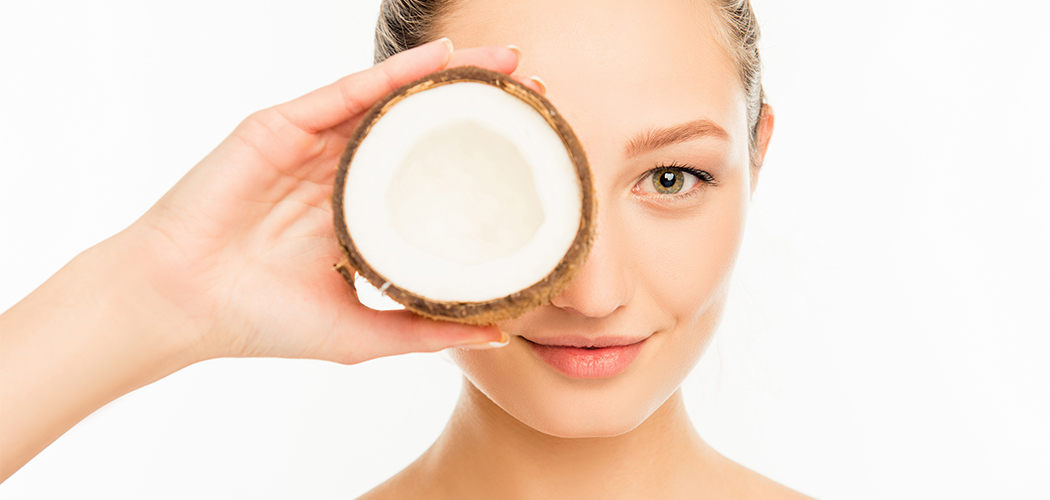Coconut oil has been around as a cure-all for centuries, but recently, the uses of this oil have blown up. More and more people are shifting to this elixir by using coconut oil for skin, beauty, hair, baby care and even cooking.
However, with the amount of clout this product is receiving, it is difficult to pinpoint which is the myth and what is reality. Understanding the true benefits of coconut oil on skin or any other use is important before you move on to maximizing this benefit according to your needs. In this blog, we will break down the importance of this superfood along with its myriad benefits with regard toyour skin. By the end, you should have an answer on whether coconut oil good for skin is a true statement.
What Is Coconut Oil?
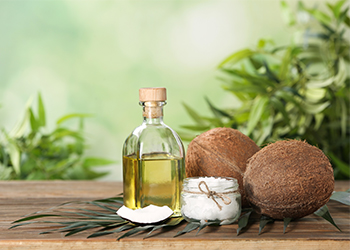
Before getting into its benefits, we first need to understand what coconut oil is. Coconut oil is derived from raw coconut and dried coconut kernels and extracted in such a way that you get a thick oil that is rich in lauric acid and saturated fats. The composition of the oil is such that it is solid at room temperature and melts into a liquid state when heated. Storing the oil in a cool, dark place and away from sunlight increases its potency and keeps it in a useable state.
You must also know that coconut oil comes in two forms- refined or unrefined (virgin coconut oil). Unrefined oil and virgin coconut oil for skin are both popular choices since their benefits and composition are almost the same. Most of the benefits of coconut oil on the skin arise from its composition, which is made of LDL Cholesterol and MCTs along with lauric acid.
It Can Kill Harmful Microorganisms
One of the reasons why coconut oil for skin is a popular choice is its antibacterial and antimicrobial properties. Due to these properties, the oil forms a protective barrier to external bacteria or environmental stressors and keeps the skin free of infections, acne, or even cellulitis. The presence of lauric acid, capric acid and MCTs (Medium Chain Triglycerides) contribute to these properties that fight harmful microorganisms. The MCTs in coconut oil also prevent itchiness or irritated skin that is a common symptom of eczema. Due to this, it is a common treatment for itchy skin.

Coconut Oil Could Reduce Inflammation
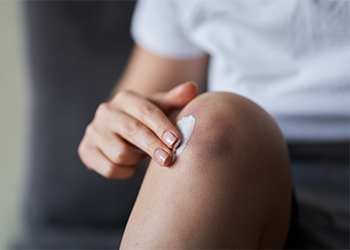
One of the prominent benefits of coconut oil on skin is the fact that it reduces inflammation. If you have a nasty fall and come home with cuts and bruises, or burn yourself while cooking, having a bottle of coconut oil at home to treat the scrapes can be very handy. The properties that make coconut oil for skin, especially inflamed bruises, is its antibacterial and antioxidant components. The antioxidants in the oil neutralize the active, radical compounds that cause inflammation, hence soothing the area. The pain relief comes from rubbing coconut oil as a cold compress, especially on burns.
Coconut oil is especially useful when treating cuts because it not only reduces the inflammation but its antibacterial properties also protect the open wound from getting infected. You can use coconut oil for skin that suffers from chronic inflammation as well. This is usually the case with psoriasis, contact dermatitis, and eczema patients.
Coconut Oil May Help Treat Acne
If you’re looking for broader benefits of coconut oil on skin everyday, look no further. The first and most useful benefit is based on the fact thatcoconut oil good for skin treatment. This contributes to its combatting powers against acne. Due to this reason, many dermatologists also recommend its use. Acne is a form of inflammation and as we saw above, coconut oil reduces this and soothes the skin of any redness or blemishes. The lauric acid in coconut oil is also said to kill the bacteria responsible for acne on your skin.
Another way in which the benefits of coconut oil on skin everyday are apparent is its use as a key ingredient in beauty products. This is mainly because coconut oil is 100% natural and hydrates the skin by going deep into your pores. This hydrating property greatly reduces the chances of a reaction to the product. Coconut oil for skin is also used to treat redness and fine lines and wrinkles that cause ageing.
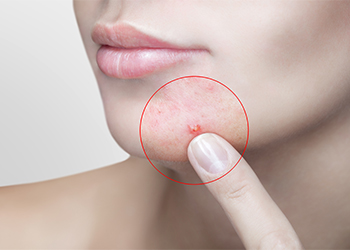
Coconut Oil Can Moisturize Dry Skin
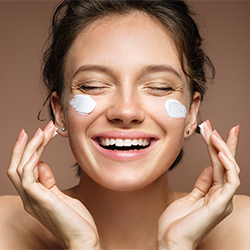
If you want smooth skin in the midst of a dry winter, look no further than coconut oil. When using coconut oil for skin, the results are almost immediate, with your skin feeling more hydrated and your pores opening up. The fatty lipids in coconut oil act as essential oils would, but with more potency because coconut oil is not just a moisturiser but also a hydrating agent. Due to this reason, the oil is used as a treatment for scaly skin, especially with eczema patients.
Coconut oil is also a great base for a DIY exfoliant. When used with a coarse substance like sea salt, the oil can cleanse your skin.
Coconut Oil May Help With Wound Healing
Coconut oil and wound healing go hand in hand. Like we’ve mentioned before, using coconut oil can be extremely beneficial when cleaning up wounds due to its antibacterial properties that add a protective layer to the skin. When healing wounds, if you don’t have a bottle of refined coconut oil (which we recommend you do), you can also use virgin coconut oil for skin. The unrefined oil still contains all the components that refined coconut oil has but is mainly used as a cooking oil. Coconut oil works best when applied directly to the affected area. The oil works as an antioxidant, reduces inflammation, protects the skin from catching an infection and encourages the forming of collagen, which is the main component that stops blood from flowing and packs the wound.

Who Shouldn’t Use Coconut Oil?
While coconut oil is good for almost all skin types, it may not be as effective for some. In fact, it can also be detrimental to some skin types. So, how do we know which skin it suits? As a rule, using excess coconut oil for skin that is already oily can only increase the oily texture and maybe even contribute to the formation of blackheads. Coconut oil may react badly to sensitive skin as well, so if you have it, use it gently and sparingly. You can also do a patch test to see how the oil reacts to your skin since everybody is different and you cannot predict the effects of substances on yours. Trial and error is the best way to go ahead.
If you cannot use coconut oil on your skin, you can always include virgin coconut oil in your diet to gain the same nutrients in an alternative way. If you have skin conditions or are already on medication or treatment, please consult with your dermatologist before use.
Which Type of Coconut Oil Is The Best?
We know that coconut oil comes in two forms- refined and unrefined. The refined kind is made from dry processing. This involves using coconut to create kernels from which you can extract the oil. After this, the oil goes through processing, which results in a more bleached, fragrant form of the oil. This normally provides heat to your skin. The unrefined, more organic version of coconut oil is what we call virgin coconut oil. This is made from raw coconut meat and is cold-pressed, making it helpful to soothe burns. The refined coconut oil is great for cooking at high temperatures, but due to its organic nature, virgin coconut oil for skin is your best choice.
Studies show that using virgin coconut oil for skin provides better results as the oil retains more of its antioxidant properties and is better suited to reduce inflammation and treat wounds. This oil is also much gentler on your skin, which means if you have sensitive skin or pre-existing conditions, it is always better to use natural, virgin coconut oil rather than the refined variety.
Why Should You Use Parachute Advansed Skincare Products?
Now that you’re aware of everything related to coconut oil for skin and its many benefits, it is important to choose the right product. Some products may contain coconut but only at a negligible level, while others may be too refined to provide any actual advantages. If you want a 100% natural solution that retains all the goodness of coconut, use the Parachute Advansed Skin Care range. These products emphasize putting coconut at the forefront and reduce the possibility of chemicals interfering with the treatment. The Parachute Advansed range is also extremely popular and backed by scientists. As it has a whole range from baby care to skincare, the products obtain all the benefits of coconut oil on skin and customize to your requirements.
Frequently Added Questions
Can coconut oil make lips pink?
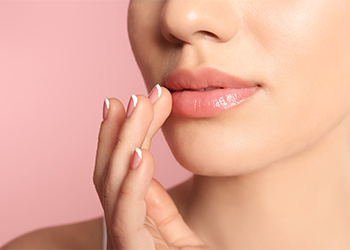
Coconut Oil – Vitamin E – Vitamin C – Alpha Hydroxy Acids are all great restorers of balanced skin tones and repairing sun damage to exposed skin.
Can coconut oil remove dark spots?
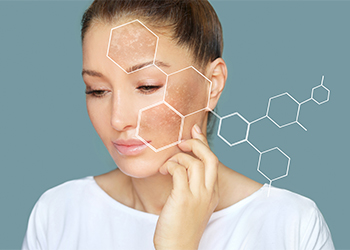
The benefits of coconut oil on skin are bountiful, and removing dark spots is one of them. Dark spots are caused due to excessive skin pigmentation, sun exposure, acne and even hormonal changes. Coconut oil can not only reduce the dark spots but can also prevent them from forming again. The oil’s antioxidant properties can reduce the spots and moisturise the skin, improving its overall appearance. Furthermore, using coconut oil for skinmoisturisation has proven to reduce blemishes and help with eradicating acne more effectively so that it does not leave behind dark spots. At the same time, coconut oil can also prevent tanning, if you use it before stepping out in the sun as it acts much like an SPF cream (100% natural but not as effective).
To Sum Up
There is plenty of scientist-backed evidence to prove the benefits of coconut oil on skin of all types. It is important to have a product you can rely on for not just one, but several needs, and especially when you are bruised. Coconut oil provides a 100% natural solution to your skin problems and is very effective in the treatment. The use of coconut oil through generations has taught us that sometimes the best solution is the one that is tried and tested.
Explore our blog section to read more about topics such as Health Benefits of Coconut Oil, how to use Extra Virgin Coconut Oil for Hair Loss, Is Coconut Oil good for Face, Is Coconut Oil good for Acne and so on to keep your skin glowing.



